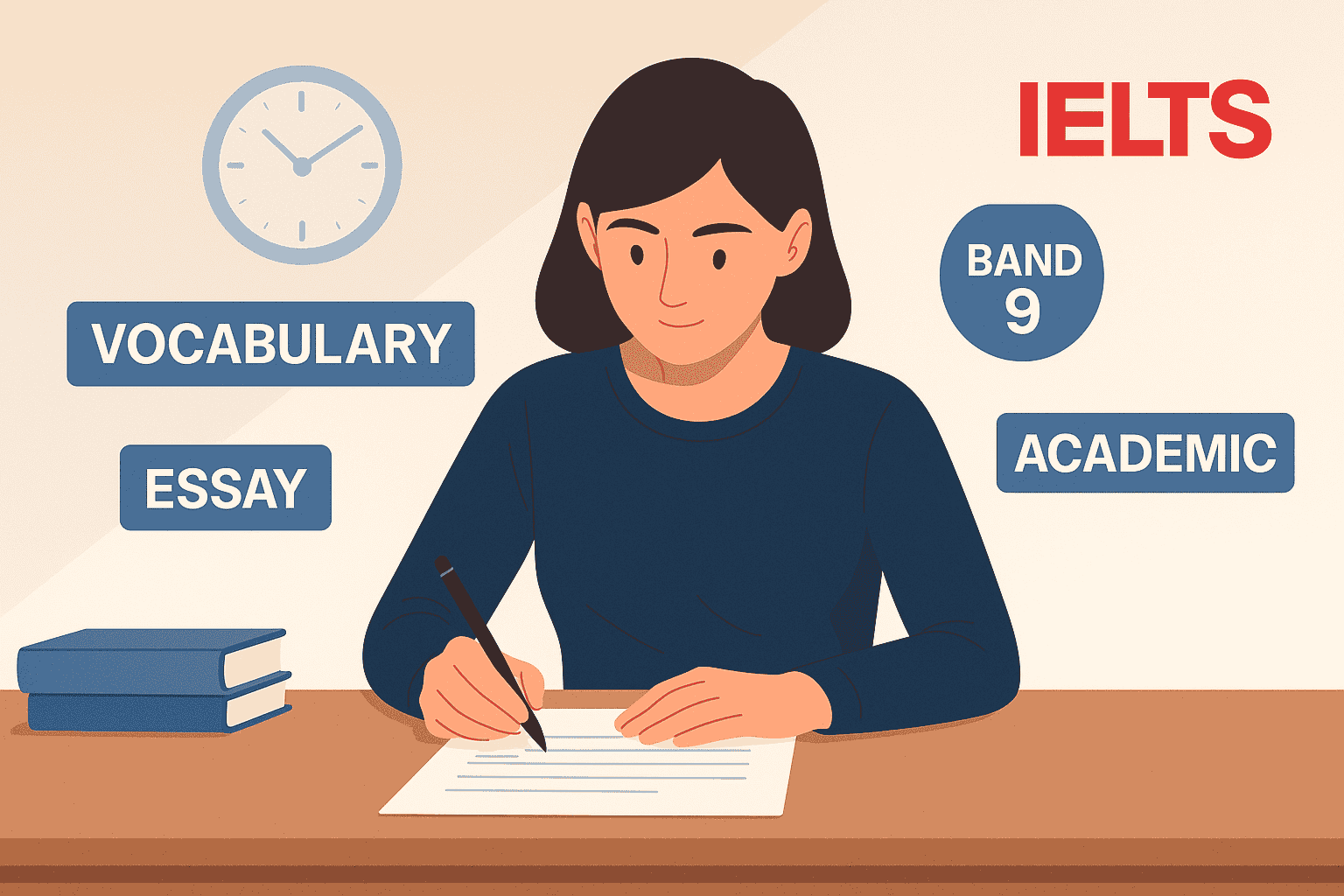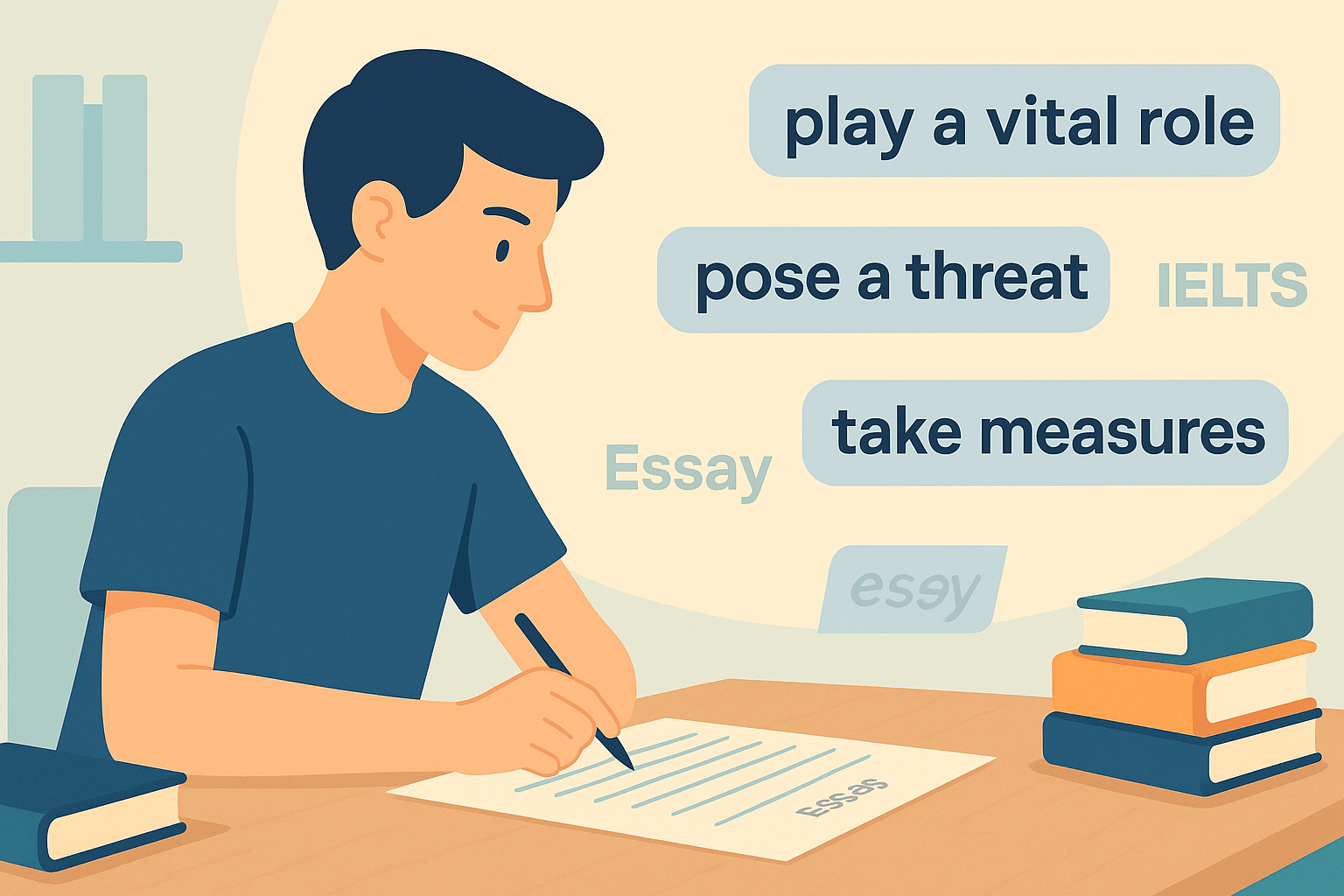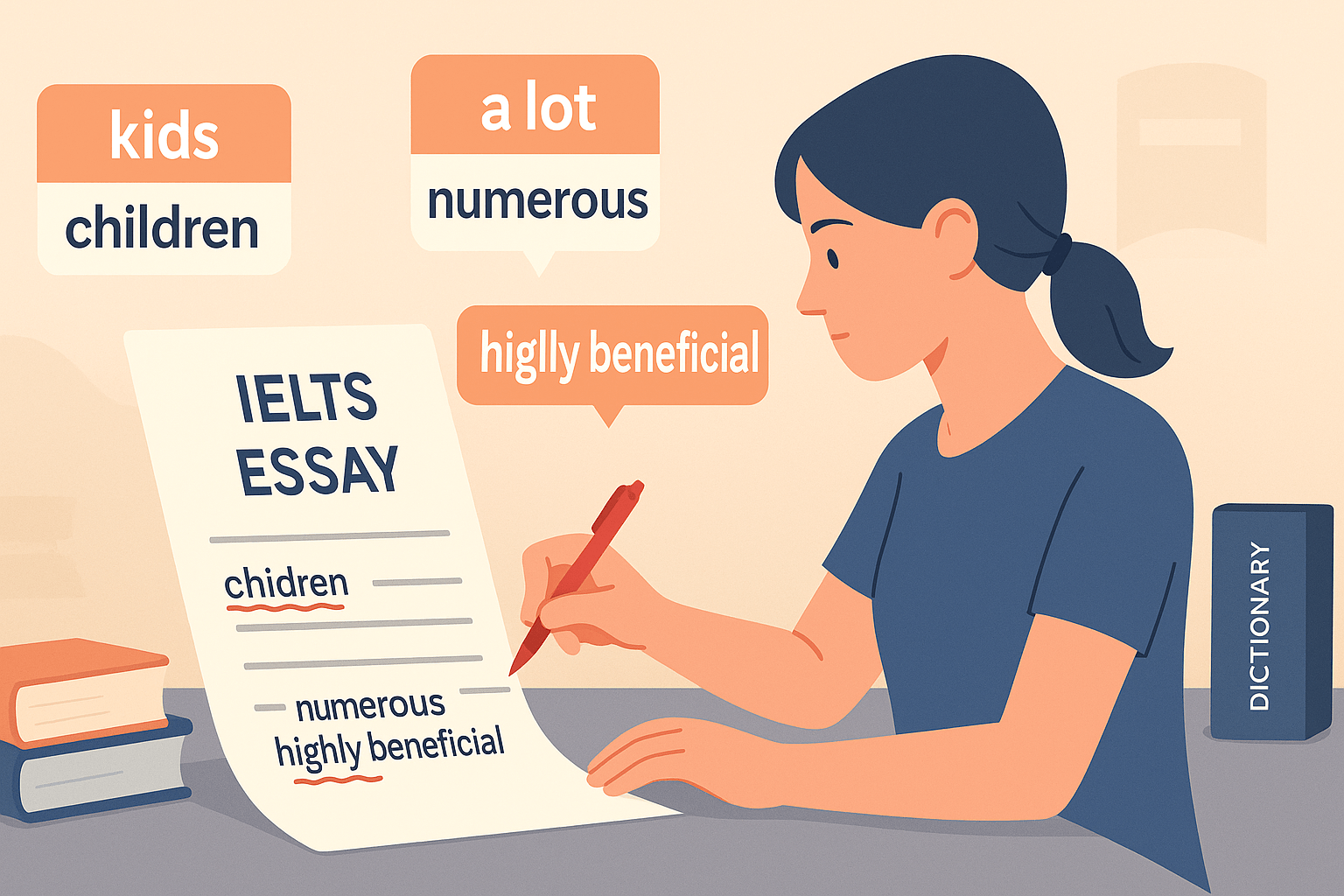When my students ask, “How do I score Band 7–9 in IELTS Writing Task 2?” my answer always includes one key element: vocabulary.
It’s not just about using “difficult words” – it’s about choosing the right academic words, natural phrases, and accurate collocations that make your ideas clear, formal, and cohesive.
In this guide, I’ll share my complete approach to IELTS Writing Task 2 vocabulary, including:
- ✅ How to start and end essays confidently
- ✅ Band 7–9 vocabulary for body paragraphs
- ✅ Synonyms to avoid repeating common words
- ✅ Linking words and cohesive devices for clarity
By the end, you’ll know exactly how to use vocabulary to impress the examiner and boost your Task 2 score.
What is IELTS Writing Task 2 Vocabulary?
IELTS Writing Task 2 vocabulary refers to formal, academic words, collocations, and phrases that make your essay clear, professional, and examiner-friendly.
This includes:
- Introduction phrases to start your essay
- Opinion and argument vocabulary
- Body paragraph linking words for coherence
- Synonyms to avoid repetition
- Conclusion phrases to wrap up smoothly
If you want to level up your vocabulary, explore my dedicated posts:
- High-Scoring IELTS Writing Task 2 Synonyms
- IELTS Writing Task 2 Linking Words & Connectors
- IELTS Writing Task 2 Phrases
Essential Vocabulary for IELTS Writing Task 2
Let’s break it down step by step, just like I do in class.
1. Vocabulary for Introductions
A strong introduction sets the tone for your essay.
Avoid starting with casual phrases like “I think…” or “In my opinion…” immediately.
Instead, use formal academic openers:
- It is often argued that…
- Many people believe that…
- There is no denying that…
- In recent years, … has become a major concern.
- It is widely accepted that…
Example:
“It is widely accepted that technology has transformed the way we communicate and interact with one another.”
2. Vocabulary for Giving Opinions
When the question asks for your viewpoint (agree/disagree or opinion essays), these phrases sound formal and confident:
- From my perspective…
- I firmly believe that…
- It is my conviction that…
- I am inclined to agree that…
- In my view…
Example:
“From my perspective, stricter traffic laws are essential to reduce urban congestion.”
Learn more with our IELTS Opinion Essay Vocabulary to master agree/disagree essays.
3. Vocabulary for Body Paragraphs
Linking words are critical for coherence and cohesion, which make up 25% of your Writing score.
A. Addition (to add points)
- moreover
- furthermore
- in addition
- what is more
B. Contrast (to show differences)
- however
- on the other hand
- conversely
- nevertheless
C. Cause & Effect (to explain results)
- therefore
- as a result
- consequently
- due to / owing to
D. Examples (to support ideas)
- for example
- for instance
- such as
- namely
Example body sentence:
“Many people choose online education due to its flexibility. For example, working professionals can attend virtual classes without leaving their jobs.”
🔗 Explore: IELTS Discussion Essay Vocabulary, IELTS Advantages and Disadvantages Essay Vocabulary, and IELTS Problem and Solution Essay Vocabulary to cover all essay types.
4. Vocabulary for Conclusions
A smooth conclusion signals that your essay is ending naturally.
Use these formal closing phrases:
- In conclusion…
- To sum up…
- Overall, it can be said that…
- All things considered…
- Taking everything into account…
Example:
“In conclusion, while social media brings people closer virtually, it may also lead to less meaningful real-life interactions.”
Also see: IELTS Cause and Effect Essay Vocabulary for formal consequence language.
Band 9 Synonyms: Avoiding Common Words
Examiners dislike repetition of basic words.
Upgrade your vocabulary with formal alternatives:
| Common Word | Band 9 Alternative |
|---|---|
| Good | Beneficial, Advantageous |
| Bad | Detrimental, Harmful |
| Big | Significant, Substantial |
| Small | Minor, Minimal |
| Important | Crucial, Essential |
| Many | Numerous, A considerable number of |
| Show | Demonstrate, Illustrate |
Tip: Only use a synonym if it fits the context naturally.
✅ Learn more with:
Sample Upgrade Exercise
Before (Band 6):
“Many people think cars are bad for the environment.”
After (Band 8+):
“Many argue that the widespread use of private vehicles has detrimental effects on the environment.”
How Vocabulary Affects Your IELTS Band Score
Vocabulary contributes to Lexical Resource, which is 25% of your Writing Task 2 score.
To reach Band 7–9, you must:
- ✅ Use a wide range of vocabulary naturally
- ✅ Avoid repeating simple words
- ✅ Use collocations and academic expressions
- ✅ Maintain accuracy – wrong word choice lowers your score
🔗 Complement this with IELTS Writing Practice Tests and IELTS Grammar for Writing.
FAQ Section
Q1: What vocabulary is needed for IELTS Writing Task 2?
Use formal academic words, linking phrases, and topic-specific vocabulary. Avoid informal words and contractions.
Q2: Can vocabulary alone get me Band 9?
No. You need strong grammar, clear ideas, and vocabulary used in context.
Q3: Should I use rare or complex words to impress the examiner?
No. Focus on accuracy and natural academic words instead of forcing unusual vocabulary.
Final Teacher’s Tip
Mastering IELTS Writing Task 2 vocabulary is like adding the final polish to your essay.
When you:
- Use formal expressions in your introduction and conclusion,
- Connect your ideas with cohesive devices, and
- Upgrade common words with precise synonyms,
… you’re already on the path to Band 7–9.
📖 Official Resources:
Essential Vocabulary for IELTS Writ
Next Step: Start with our IELTS Opinion Essay Vocabulary to tackle agree/disagree questions with confidence.






14 Responses